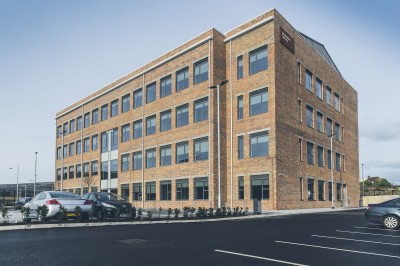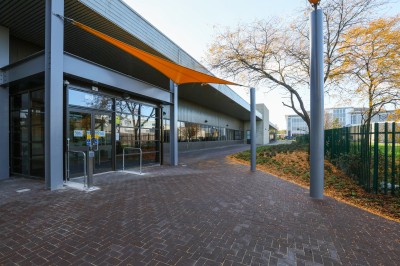In today's dynamic business landscape, the choice of office space plays a pivotal role in shaping a company's trajectory. Your office isn't merely a physical location; it's a hub of productivity, innovation, and networking opportunities. Therefore, deciding where your business operates goes beyond just aesthetics; it profoundly influences your daily operations, employee morale, and overall success.
Browse our available co-working spaces in London >
Factors to Consider When Choosing Office Space
Whether you lead a tech start-up, manage a law firm, a creative agency, or even a financial institution, selecting the perfect office space tailored to your industry and unique needs can make a significant difference in its operations.
Several critical factors come into play when selecting your ideal office space. These factors can significantly influence your daily operations, collaboration dynamics, and even your business's image. To simplify this process, let's break down the key considerations:
- Office Space Selection Tips
- Prioritize a central or strategic location close to your partners and clientele.
- Look for accessibility for clients and partners.
- Aesthetics and Amenities
- Create an appealing workspace that boosts productivity.
- Consider amenities like cafes and gyms for employee satisfaction.\
- Balancing Design and Functionality
- Ensure your workspace design facilitates both teamwork and individual tasks.
- Seek a balance between aesthetics and functionality. You don’t want to lose one over another.
- Choosing the Right Office Space
- Decide on your work model. Hybrid, remote, on-site – all models offer various benefits and carry their own disadvantages.
- Understand how design impacts productivity and workflows.
- Look for a well-designed office that stimulates the work experience functionally, visually, and mentally.
- Determining Space Requirements
- Assess your current team size and future growth plans.
- Determine what type of space would make the work in your office easier.
- Account for meeting rooms, private workspaces, and common areas.
- Account for meeting rooms, private workspaces, and common areas.
- Exploring Office Types
- Consider traditional suites for a more personal, professional image.
- Explore co-working spaces for collaborative and flexible environments.
- Find serviced office space that cater to your business needs.
- Visit managed offices for a completely equipped, personalised space.
- Office Space Location Considerations
- Proximity and accessibility to clients, partners and vital business amenities are crucial for a well-functioning company.
- Ensure your office is situated in well-connected areas with transport links for easy commuting.
- Alignment with Brand Image
- Choose a location that reflects your brand's identity and values.
- Reflect a cohesive and appealing image through your office's site.
- Office Space Size Requirements
- Determine your current space requirements based on team size.
- Consider the need for meeting rooms, private workspaces, and communal areas.
- Prepare for unexpected business growth or any other structural changes that might influence your size needs.
- Planning for Growth
- Anticipate future growth plans to avoid frequent relocations.
- Seek a workspace that is flexible enough to adapt to your growing needs.
These are the core factors shaping a solid foundation for your office space selection process. By examining each aspect in detail, you'll be better equipped to make a well-informed decision that aligns with your business type and sets the stage for success. Taking these factors into consideration allows you to decide whether you need a serviced office space, a managed office or perhaps a co-working office space.
Matching the Office Spaces to Your Business Needs
The concept of one-size-fits-all simply doesn't apply. Each business type, from tech start-ups to law firms, creative agencies, and financial institutions, has unique needs, aspirations, and work culture. To truly harness the potential of your workspace and optimize your operations, it's essential to align your choice of office space with the specific demands of your business type.
Tech Start-ups: Nurturing Innovation and Collaboration
Tech start-ups thrive on innovation, agility, and collaboration. The bustling energy of these dynamic enterprises demands a workspace that reflects their ethos. For tech innovators, co-working spaces and shared offices are often the perfect match. A very popular choice amongst tech start-ups in London is offices in Kings Cross, Some of the world tech giants, such as YouTube and Google, are settled in the area.
Recommended Office Types: Co-working Spaces, Shared Offices, Serviced Offices
Tech start-ups are known for their rapid growth and adaptability. They need office spaces that can scale with them. These offices often offer flexible leasing options, allowing start-ups to expand or downsize without the burden of long-term commitments. This agility is essential for accommodating evolving team sizes and project demands.
Innovation thrives in environments where ideas flow freely. Co-working spaces foster collaboration and networking, providing opportunities for tech professionals to connect, share knowledge, and build partnerships. These shared environments often host networking events, workshops, and meetups, creating a vibrant ecosystem for tech enthusiasts.
Law Firms: Prioritising Professionalism and Credibility
In the world of law, professionalism, confidentiality, and credibility is paramount. Law firms require office spaces that project an image of trust and competence. Traditional office suites and private offices are typically the top choices.
Recommended Office Types: Managed Offices, Traditional Office Suites, Private Offices
A law firm's office space design should convey professionalism and instil confidence in clients. Think elegant reception areas, well-appointed meeting rooms, and private offices for attorneys. A meticulously designed space enhances the firm's reputation and credibility.
Confidentiality is the cornerstone of legal practice. Private offices offer a secure environment for sensitive discussions and document handling. Law firms also invest in robust security measures, ensuring that client information remains confidential and protected.
Creative Agencies: Fostering Creativity and Networking
Creative agencies thrive on imagination and collaboration, including graphic design firms, copywriting studios, and content creators. These businesses often find inspiration in unique office environments, such as creative co-working spaces and design studios.
Recommended Office Types: Creative Co-working Spaces, Serviced Offices, Design Studios
Creative professionals need a workspace that sparks inspiration. Creative co-working spaces are often designed with artistic flair, featuring unique decor, art installations, and vibrant common areas. This creative ambience helps designers and artists tap into their imaginative potential.
The creative industry benefits greatly from networking and collaboration. Therefore, co-working spaces are perfect for hosting events, exhibitions, and workshops, providing opportunities for professionals to connect, share ideas, and collaborate on projects. These spaces become hubs of creativity and innovation.
Financial Firms: Combining Security and Technology
Financial institutions, including banks and investment firms, operate in a high-stakes environment where security and technology are paramount. Secure private offices and financial hubs are the preferred choices. Office spaces in the City of London are part of the financial centre of the capital and the whole of the country, therefore, it’s a great location if your business works with finances.
Recommended Office Types: Secure Managed Offices, Secured Private Offices, Traditional Offices, Financial Hubs
Financial firms handle sensitive financial data and transactions. Secure private offices offer controlled access and heightened security measures to protect valuable assets and client information. Additionally, these offices often feature integrated technology solutions for financial analysis and trading.
Trading floors are essential for firms engaged in trading and financial markets. These layouts are meticulously designed to optimize communication and information flow. Multiple screens, data terminals, and collaboration spaces enable traders to make informed decisions swiftly.
Marketing Agencies: Inspiring Creativity and Collaboration
Marketing agencies are hotbeds of creativity, strategy, and client collaboration. Collaborative workspaces and design studios are ideal choices for marketing professionals.
Recommended Office Types: Collaborative Workspaces, Design Studios
Marketing thrives on creative thinking and brainstorming. Collaborative workspaces are designed to foster creativity by providing open areas for brainstorming sessions, imagination, and collaboration. These spaces encourage team members to bounce ideas off each other, resulting in innovative marketing strategies.
Marketing agencies often work on client campaigns that require intense collaboration. Collaborative workspaces offer the flexibility to adapt meeting areas to project-specific needs. Whether a client pitch or a creative brainstorm, these spaces provide a dynamic, collaborative environment.
Call Centres: Maximizing Efficiency and Comfort
Call centres are the heartbeat of customer service and sales for many businesses. The layout and design of their office spaces play a crucial role in their success. Here's how call centres can create spaces that maximize efficiency and comfort:
Recommended Office Types: Open Office Layouts, Cubicle Designs
Call centre operations often involve a high volume of phone calls and interactions. Open office layouts with rows of workstations are a popular choice. This design promotes communication and teamwork among agents, ensuring they can quickly address customer inquiries and share information.
Call centre employees spend extended hours at their desks, making ergonomic considerations paramount. Comfortable chairs, adjustable desks, and noise-cancelling headphones create a more pleasant working environment. Providing break areas with comfortable seating allows agents to recharge during breaks.
Non-profit Organizations: Balancing Budgets and Impact
Non-profit organizations operate with limited budgets while striving to impact society positively. Their choice of office space should reflect this balance. Here's how non-profits can optimize their office environments:
Recommended Office Types: Co-working Spaces, Non-profit Hubs
Non-profits often seek cost-effective solutions. Co-working spaces offer flexible leasing options and shared resources, making them budget-friendly. These spaces also provide networking opportunities with other organizations that share similar missions.
Non-profits thrive when they can collaborate with like-minded organizations. Non-profit hubs or shared workspaces explicitly designed for mission-driven organizations offer an ideal environment for collaboration. Shared meeting rooms and communal areas facilitate networking and idea-sharing.
Government Agencies: Prioritizing Security and Accessibility
Government agencies handle sensitive information and serve the public. Security and accessibility are top priorities. Here's how government agencies can tailor their office spaces to meet these needs:
Recommended Office Types: Secure Managed Offices, Secure Government Offices, Accessible Locations
Government agencies require secure office spaces to protect classified information. Certain government offices often feature controlled access, surveillance, and data encryption. These measures ensure that sensitive data remains confidential.
Government agencies must be easily accessible to the public. Choosing office spaces in central locations close to public transportation ensures citizens can access government services conveniently. Accessible areas enhance the agency's commitment to serving the community.
E-commerce Ventures: Adapting to Digital Demand
E-commerce businesses thrive in the digital realm, but they still require physical office spaces to manage operations, logistics, and customer service.
Recommended Office Types: Traditional Offices, Managed Offices
E-commerce businesses with a focus on order fulfilment benefit from logistics centres. These office spaces are strategically placed close to the storage space, making managing inventory, packing, and shipping easy. Proximity to shipping carriers is also a consideration.
The digital nature of e-commerce allows for remote work, but managed office spaces remain essential for brainstorming, strategy meetings, and customer support. These offices should facilitate teamwork and innovation, even in a primarily digital business model.
Real Estate Agencies: Location and Presentation
Real estate agencies deal with properties, and their office space serves as a showcase for their listings and services.
Recommended Office Types: Managed Office Space, Showrooms, High-visibility Offices,
Real estate agencies often have showrooms to present properties to clients. These showrooms should be designed to highlight the features of the listings, with multimedia presentations, high-quality images, and comfortable meeting areas.
The location of real estate offices matters. High-visibility offices in busy areas attract walk-in clients. Easy access to the office and a welcoming reception area are essential for making a positive first impression on potential clients.
Sales Teams: Meeting Clients and Prospects
Sales teams are at the forefront of client interaction and need office spaces that cater to meetings, presentations, and relationship-building.
Recommended Office Types: Managed Offices, Meeting Rooms, Traditional Offices
For sales teams, having client-centric offices is essential. These spaces are designed to make a positive impression on clients and prospects. They often feature well-appointed meeting rooms with modern technology for presentations and discussions.
Sales teams thrive in environments that prioritize meetings. Meeting rooms equipped with video conferencing capabilities, comfortable seating, and collaboration tools ensure that sales professionals can engage effectively with clients, whether in-person or remotely.
Ideal Offices for Remote Teams: Flexibility and Technology
Remote teams are becoming increasingly common in today's digital landscape. Their office spaces should support remote work and collaboration.
Recommended Office Types: Virtual Office Solutions, Remote Work-Friendly Spaces
Virtual office solutions offer remote teams a professional business address and telephone answering services while team members work remotely. This arrangement provides credibility and a central point of contact for clients.
Remote teams benefit from office spaces that accommodate occasional in-person meetings and collaborative work sessions. Flexible workspaces with hot desks and meeting rooms equipped with video conferencing technology facilitate remote team interactions.
Workspaces for Travelling Teams: Mobility and Connectivity
Travelling teams, such as consultants or salespeople on the go, need office spaces that support mobility and connectivity.
Recommended Office Types: Co-working Spaces, Serviced Offices
Travelling teams can benefit from co-working spaces in various locations. Depending on client needs, these spaces offer flexibility and the ability to work from different cities or regions. Co-working memberships often include access to a network of offices.
Traveller-friendly offices near transportation hubs are ideal for teams frequently on the road. These offices offer a convenient place to work between meetings or while waiting for flights. They should provide secure storage for equipment and easy access to charging stations.
Collaborative Teams: Creative Spaces for Ideas
Teams that thrive on creativity and collaboration, such as design or innovation teams, require office spaces that encourage brainstorming and idea-sharing.
Recommended Office Types: Collaborative Workspaces, Creative Studios
Collaborative teams often need open and flexible workspaces that encourage brainstorming and creativity. These spaces may include whiteboards, writable walls, and comfortable seating for impromptu discussions.
For teams focused on innovation, creative studios equipped with cutting-edge technology and resources can fuel creativity. These studios provide the tools necessary to bring concepts to life through design, prototyping, or experimentation.
Small Businesses: Growth and Efficiency
Small businesses seek office spaces that balance growth potential with efficiency and cost-effectiveness.
Recommended Office Types: Small Business Incubators, Serviced Offices
Small business incubators offer an environment that supports growth and networking. These spaces often provide mentorship, resources, and connections to help small businesses expand.
Efficiency is crucial for small businesses. Office spaces designed for cost-effectiveness may include shared amenities, flexible lease terms, and scalability options, allowing small businesses to adapt to changing needs without excessive overhead.
Best Office Space Large Businesses: Scalability and Identity
Large businesses require office spaces that can scale with their operations while maintaining a distinct corporate identity.
Recommended Office Types: Corporate Campuses, Identity-driven Spaces
Large businesses often opt for corporate campuses that offer ample room for expansion. These campuses can accommodate multiple departments and teams while allowing for future growth.
Maintaining a strong corporate identity is essential for large businesses. Identity-driven office spaces incorporate branding elements, such as company colours and logos, to create a cohesive and recognizable environment.
Ready to explore your options?
Selecting a suitable office space is an important decision for any business. It shapes your company's culture, productivity, and growth potential. The office space you choose today will play a crucial role in shaping an environment that fosters the success, innovation, and growth of your business.
Don't wait to take the next step. Explore your options today and find the perfect office space for your business. Whether you're a tech start-up, a law firm, a creative agency, or any other business niche, your ideal office space awaits!
So, if you're ready to find the perfect office space for your business, we're here to help. Find your perfect office in the United Kingdom, or contact the Prime Office Search expert team at info@primeofficesearch.com to find the perfect match for your business needs faster.







